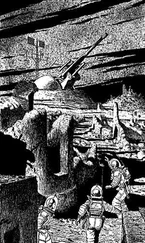“Wrong?” she said. “No more wrong than anyone else who comes in and tries to change the way things have always been done. No more right, either.”
“That ends today,” Brezan said, springing up despite her frantic attempts to get him to sit back down. “I have to do better than this. If it means sitting down every day in the middle of the university district and listening to what they have to say to me, I’ll do that. If it means bringing in riot police, I’ll do that too. Whatever it takes.”
“You don’t get it,” Emio said. “There’s no easy answer. There never has been. Just hard work. Even the Andan know that.”
He didn’t respond to the limp attempt at humor. “Then the work I’ve been doing hasn’t been enough. That changes now.”
“Fine,” Emio said. “Fine. If that’s what you want, that’s what we’ll do. But burning yourself out won’t do anyone any favors, either.”
“Out,” Brezan said. “I want to talk to Mikodez.” In real life, he knew that Mikodez was a busy man and that he was, in all likelihood, going to have to wait to talk to him. But if anyone knew how to deal with people doing stupid things because they hated you, it would be Mikodez.
Emio didn’t argue. She put in the call, then withdrew.
Brezan dozed off while waiting for it to go through. Three hours passed before he received a response.
“High General,” Mikodez said. “Emio told me about what happened.”
Of course she had. Brezan couldn’t work up any outrage. She was doing her job, after all.
“I didn’t want the boy to die,” Brezan said. He was shocked by how raw his voice sounded.
“No,” Mikodez said, more gently than Brezan had expected. “I don’t imagine you did. But for love of little foxes, don’t let on that it hurts you so much. They’ll use it against you if they figure that out.”
“I have to fix this,” Brezan said. “All of this. I’m tired of people dying for stupid reasons. The corpse calligraphers could have sent me a letter, or gathered outside the government building and chanted protest songs. Suicide? Really?”
Mikodez regarded him for a moment, then put his chin in his hands. “A few years after I took the seat,” he said, “several senior administrators—not Shuos, but Shuos-affiliates that we depended on for operations in the remoter marches—threatened suicide if I didn’t cede my position to their favored candidate.”
“What did you do?”
“I called their bluff. Said favored candidate, given a choice between my assassins and a comfortable post at one of the academies, chose the posting. Every so often he still contemplates moving on me, but that’s just habit. If he gets serious, he’ll lose his head so fast he won’t have time to blink.”
“Yes,” Brezan said bleakly, “except the students weren’t bluffing, and I’d rather not resort to assassins.”
“Learn to separate rhetorical techniques from the content of the argument,” Mikodez said.
“Coordinated suicide isn’t a rhetorical technique , Mikodez.”
“That’s debatable,” Mikodez said. “Certainly they intended it as such.”
“How do you endure this?” Brezan asked. “Any of this?”
“Ah,” Mikodez said, “that’s a different question.” His expression sobered. “Knitting and crochet and a good supply of candies, mostly. You like cooking, don’t you? Find more time to do that. Have dinner with friends when you can.”
Brezan stared at him.
“I’m being entirely sincere,” Mikodez said. “The presence of atrocity doesn’t mean you have to put your life on hold. You’ll arguably be better at dealing with the horrible things you have to witness, or even to perpetrate, if you allow yourself time to do the small, simple things that make you happy. Instead of looking for ways to destroy yourself.”
“Maybe that works if the only thing you have for a heart is a hard ice shell,” Brezan retorted.
Mikodez took no offense, as Brezan had known would be the case. “And yet I’ve been here doing this job for decades,” he said mildly, “and I haven’t shot myself in despair at the impossibility of the task. Are you going to give up now, or will you find some way to persevere?”
“I’ll keep going,” Brezan said. “I have to. If it means becoming more like you, then so be it.”

CHAPTER NINE
IT HADN’T TAKEN long for Dhanneth to pack Jedao’s belongings. Jedao refrained from doing it himself, on the grounds that it would offend Dhanneth’s sense of propriety. At least there was little to pack since the beautiful furnishings weren’t, to his relief, coming with him.
Who am I kidding? Jedao thought, eyeing the duffel bag. He owned a modest allotment of clothing, nothing more. At some point there had even materialized a small selection of civilian clothes. He’d checked the grid and learned that they conformed to current fashion in polite society, always reassuring.
A group of six servitors arrived and whistled at Jedao. He ignored them despite feeling rude about it because he’d learned that everyone else did so.
Still, Dhanneth must have read his discomfort. “Sir,” he said, “they’re just station servitors. They’re here to transfer your belongings.”
The servitor in the lead made an affirmative buzzing. The rest of them worked efficiently to transfer the duffel bag. The task didn’t require that many of them, but maybe the servitors doubled as defense. One more thing he should ask the grid about when he got a chance.
Kujen showed up shortly afterward. Four Kel and two Nirai accompanied him. The Kel, regular soldiers, were resplendent in full formal, gold braid and epaulets gleaming: two men and two women, matched in height, with similar sculpted faces. The kind of irrelevant detail Kujen would select for.
The two Nirai, on the other hand, didn’t resemble each other, and their clothes didn’t match, either. The taller one had rolled-up sleeves, as though they’d been diving into the guts of some unlucky machine. Kujen would have picked them for ability, not looks.
“Hexarch,” Jedao said, and nodded at the Kel. “Your names?” The Kel recited them.
Kujen tolerated this. “I’m glad everyone’s ready,” he said. “Let’s go. I will miss the opportunity to eat decent food in public without incurring disapproving stares from everyone, but it can’t be helped.”
Dhanneth had briefed Jedao on what to do. Jedao fell in behind the two Nirai, wondering peripherally what would become of the extravagant suite he’d vacated.
“For love of stars above,” Kujen said, stopping dead in his tracks, “what are you doing all the way back there?” His gaze swept to Dhanneth. “I might have guessed.”
“I’m sorry,” Jedao said, “was there some other way you wanted to do this?”
“Kel Command can’t censure you over protocol,” Kujen said, “and I can’t talk to you if you’re hanging back there.”
I should be grateful , Jedao thought. Why aren’t I grateful?
This time variable layout came as less of a shock, especially since he’d had a chance to speculate about all the ways you could use it to set traps. (The grid had been disarmingly uninformative about the topic.) His othersense continued to operate, but Jedao had learned how to shove it into the background so it became less of a distraction.
They arrived at their destination quickly enough, the bay where their shuttle awaited them. Jedao forced himself not to slow down, despite his distrust of the unfamiliar space and its vastness. If Kujen had inadequate security, they were doomed anyway.
Читать дальше













